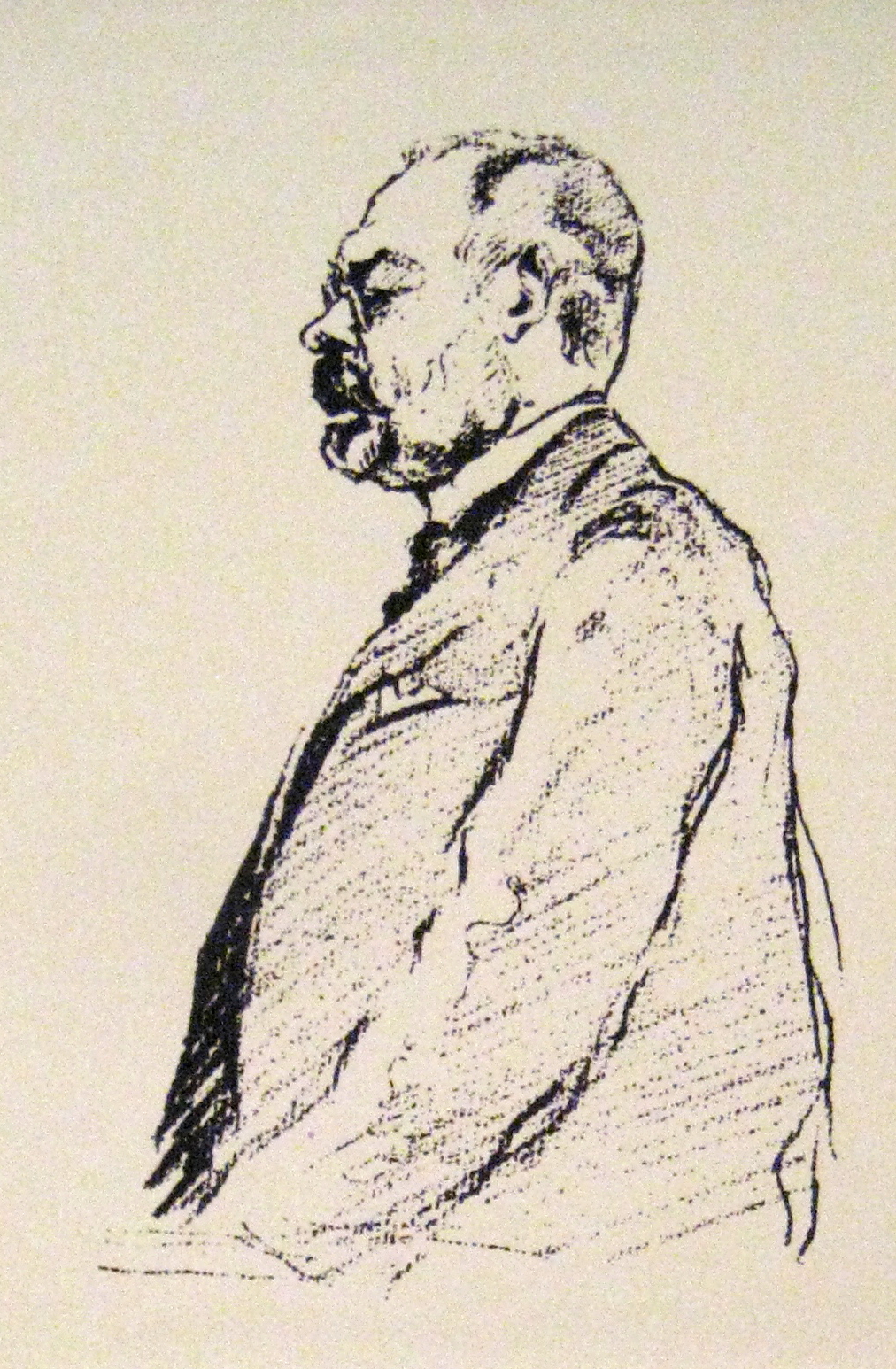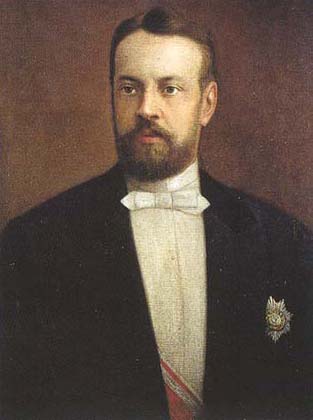|
Octobrist Party
The Union of 17 October (russian: –°–ĺ—é–∑ 17 –ě–ļ—ā—Ź–Ī—Ä—Ź, ''Soyuz 17 Oktyabrya''), commonly known as the Octobrist Party (Russian: –ě–ļ—ā—Ź–Ī—Ä–ł—Ā—ā—č, ''Oktyabristy''), was a liberal-reformist constitutional monarchist political party in late Imperial Russia. It represented moderately right-wing, anti-revolutionary, and constitutionalist views. History The party's programme of moderate constitutionalism called for the fulfilment of Tsar Nicholas II's ''October Manifesto'' granted at the peak of the Russian Revolution of 1905. Founded in late October 1905, from 1906 the party was led by the industrialist Alexander Guchkov who drew support from centrist-liberal gentry, businessmen, and some bureaucrats. Unlike their immediate neighbors to the Left, Constitutional Democrats, the Octobrists were firmly committed to a system of constitutional monarchy. At the same time they emphasised the need for a strong parliament and a government that would be responsible to it. They w ... [...More Info...] [...Related Items...] OR: [Wikipedia] [Google] [Baidu] |
Alexander Guchkov
Alexander Ivanovich Guchkov (russian: –ź–Ľ–Ķ–ļ—Ā–įŐĀ–Ĺ–ī—Ä –ė–≤–įŐĀ–Ĺ–ĺ–≤–ł—á –ď—É—á–ļ–ĺŐĀ–≤) (14 October 1862 ‚Äď 14 February 1936) was a Russian politician, Chairman of the Third Duma and Minister of War in the Russian Provisional Government. Early years Alexander Guchkov was born in Moscow. Unlike most of the conservative politicians of that time, Guchkov did not belong to the Russian nobility. His father, the grandson of a peasant, was a factory owner of some means, whose family came from a stock of Old Believers who had acknowledged the authority of the Russian Orthodox Church while keeping their ancient ritual. His mother was French. Guchkov studied history and humanities at the Moscow State University, and, after having gone through his military training in a grenadier regiment, left for Germany where he read political economy in Berlin under Schmoller. Academic studies were, however, not suited to his active and adventurous character. He gave them up and started trav ... [...More Info...] [...Related Items...] OR: [Wikipedia] [Google] [Baidu] |
Constitutionalist
Constitutionalism is "a compound of ideas, attitudes, and patterns of behavior elaborating the principle that the authority of government derives from and is limited by a body of fundamental law". Political organizations are constitutional to the extent that they "contain institutionalized mechanisms of power control for the protection of the interests and liberties of the citizenry, including those that may be in the minority". As described by political scientist and constitutional scholar David Fellman: Definition Constitutionalism has prescriptive and descriptive uses. Law professor Gerhard Casper captured this aspect of the term in noting, "Constitutionalism has both descriptive and prescriptive connotations. Used descriptively, it refers chiefly to the historical struggle for constitutional recognition of the people's right to 'consent' and certain other rights, freedoms, and privileges. Used prescriptively, its meaning incorporates those features of government s ... [...More Info...] [...Related Items...] OR: [Wikipedia] [Google] [Baidu] |
Duma
A duma (russian: –ī—É–ľ–į) is a Russian assembly with advisory or legislative functions. The term ''boyar duma'' is used to refer to advisory councils in Russia from the 10th to 17th centuries. Starting in the 18th century, city dumas were formed across Russia. The first formally constituted state duma was the Imperial State Duma introduced to the Russian Empire by Emperor Nicholas II in 1905. The Emperor retained an absolute veto and could dismiss the State Duma at any time for a suitable reason. Nicholas dismissed the First State Duma (1906) within 75 days; elections for a second Duma took place the following year. The Russian Provisional Government dissolved the last Imperial State Duma (the fourth Duma) in 1917 during the Russian Revolution. Since 1993, the State Duma (russian: –ď–ĺ—Ā—É–ī–į—Ä—Ā—ā–≤–Ķ–Ĺ–Ĺ–į—Ź –ī—É–ľ–į, label=none) has functioned as the lower legislative house of the Russian Federation. Etymology The Russian word is inherited from the Proto-Slavic ... [...More Info...] [...Related Items...] OR: [Wikipedia] [Google] [Baidu] |
Ethnicity
An ethnic group or an ethnicity is a grouping of people who identify with each other on the basis of shared attributes that distinguish them from other groups. Those attributes can include common sets of traditions, ancestry, language, history, society, culture, nation, religion, or social treatment within their residing area. The term ethnicity is often times used interchangeably with the term nation, particularly in cases of ethnic nationalism, and is separate from the related concept of races. Ethnicity may be construed as an inherited or as a societally imposed construct. Ethnic membership tends to be defined by a shared cultural heritage, ancestry, origin myth, history, homeland, language, or dialect, symbolic systems such as religion, mythology and ritual, cuisine, dressing style, art, or physical appearance. Ethnic groups may share a narrow or broad spectrum of genetic ancestry, depending on group identification, with many groups having mixed genetic ancestry. E ... [...More Info...] [...Related Items...] OR: [Wikipedia] [Google] [Baidu] |
Pyotr Stolypin
Pyotr Arkadyevich Stolypin ( rus, –ü—Ď—ā—Ä –ź—Ä–ļ–įŐĀ–ī—Ć–Ķ–≤–ł—á –°—ā–ĺ–Ľ—čŐĀ–Ņ–ł–Ĺ, p=p ≤…Ķtr …źrňąkad ≤j…™v ≤…™t…ē st…źňąl…®p ≤…™n; ‚Äď ) was a Russian politician and statesman. He served as the third prime minister and the interior minister of the Russian Empire from 1906 until his assassination in 1911. The greatest reformer of Russian society and economy; his reforms caused unprecedented growth of Russian state which was stopped by his assassination only. Born in Dresden, Germany, to a prominent Russian aristocratic family, Stolypin became involved in government from his early 20s. His successes in public service led to rapid promotions, culminating in his appointment as interior minister under prime minister Ivan Goremykin in April 1906. In July, Goremykin resigned and was succeeded as prime minister by Stolypin. As prime minister, Stolypin initiated major agrarian reforms, known as the Stolypin reform, that granted the right of private land ownership to the peasant ... [...More Info...] [...Related Items...] OR: [Wikipedia] [Google] [Baidu] |
Sergei Witte
Count Sergei Yulyevich Witte (; ), also known as Sergius Witte, was a Russian statesman who served as the first prime minister of the Russian Empire, replacing the tsar as head of the government. Neither a liberal nor a conservative, he attracted foreign capital to boost Russia's industrialization. Witte's strategy was to avoid the danger of wars. Witte served under the last two emperors of Russia, Alexander III () and Nicholas II ().Harcave, Sidney. (2004)''Count Sergei Witte and the Twilight of Imperial Russia: A Biography,'' p. xiii./ref> During the Russo-Turkish War (1877‚Äď78), he had risen to a position in which he controlled all the traffic passing to the front along the lines of the Odessa Railways. As finance minister from 1892 to 1903, Witte presided over extensive industrialization and achieved government monopoly control over an expanded system of railroad lines. Following months of civil unrest and outbreaks of violence in what became known as the 1905 Russian ... [...More Info...] [...Related Items...] OR: [Wikipedia] [Google] [Baidu] |
Constitutional Monarchy
A constitutional monarchy, parliamentary monarchy, or democratic monarchy is a form of monarchy in which the monarch exercises their authority in accordance with a constitution and is not alone in decision making. Constitutional monarchies differ from absolute monarchies (in which a monarch is the only decision-maker) in that they are bound to exercise powers and authorities within limits prescribed by an established legal framework. Constitutional monarchies range from countries such as Liechtenstein, Monaco, Morocco, Jordan, Kuwait, and Bahrain, where the constitution grants substantial discretionary powers to the sovereign, to countries such as Australia, the United Kingdom, Canada, the Netherlands, Spain, Belgium, Sweden, Malaysia, Thailand, Cambodia, and Japan, where the monarch retains significantly less personal discretion in the exercise of their authority. ''Constitutional monarchy'' may refer to a system in which the monarch acts as a non-party political he ... [...More Info...] [...Related Items...] OR: [Wikipedia] [Google] [Baidu] |
Constitutional Democrats
) , newspaper = ''Rech'' , ideology = ConstitutionalismConstitutional monarchismLiberal democracyParliamentarism Political pluralismSocial liberalism , position = Centre to centre-left , international = , colours = Azure White , country = Russia The Constitutional Democratic Party (russian: –ö–ĺ–Ĺ—Ā—ā–ł—ā—É—Ü–ł–ĺŐĀ–Ĺ–Ĺ–ĺ-–ī–Ķ–ľ–ĺ–ļ—Ä–į—ā–łŐĀ—á–Ķ—Ā–ļ–į—Ź –Ņ–įŐĀ—Ä—ā–ł—Ź, translit=Konstitutsionno-demokraticheskaya partiya, K-D), also called Constitutional Democrats and formally the Party of People's Freedom (russian: links=no, –ü–įŐĀ—Ä—ā–ł—Ź –Ě–į—Ä–ĺŐĀ–ī–Ĺ–ĺ–Ļ –°–≤–ĺ–Ī–ĺŐĀ–ī—č), was a centrist, liberal political party in the Russian Empire that promoted Western constitutional monarchy ‚ÄĒ among other policies ‚ÄĒ and attracted a base ranging from moderate conservatives to mild socialists. Party members were called Kadets (or Cadets) from the abbreviation K-D of the party name. Konstantin Kavelin's and Boris Chicherin's writing ... [...More Info...] [...Related Items...] OR: [Wikipedia] [Google] [Baidu] |
Left-wing
Left-wing politics describes the range of political ideologies that support and seek to achieve social equality and egalitarianism, often in opposition to social hierarchy. Left-wing politics typically involve a concern for those in society whom its adherents perceive as disadvantaged relative to others as well as a belief that there are unjustified inequalities that need to be reduced or abolished. Left-wing politics are also associated with popular or state control of major political and economic institutions. According to emeritus professor of economics Barry Clark, left-wing supporters "claim that human development flourishes when individuals engage in cooperative, mutually respectful relations that can thrive only when excessive differences in status, power, and wealth are eliminated." Within the left‚Äďright political spectrum, ''Left'' and ''Right'' were coined during the French Revolution, referring to the seating arrangement in the French Estates General. Those ... [...More Info...] [...Related Items...] OR: [Wikipedia] [Google] [Baidu] |
Russian Revolution Of 1905
The Russian Revolution of 1905,. also known as the First Russian Revolution,. occurred on 22 January 1905, and was a wave of mass political and social unrest that spread through vast areas of the Russian Empire. The mass unrest was directed against the Tsar, nobility, and ruling class. It included worker strikes, peasant unrest, and military mutinies. In response to the public pressure, Tsar Nicholas II enacted some constitutional reform (namely the October Manifesto). This took the form of establishing the State Duma, the multi-party system, and the Russian Constitution of 1906. Despite popular participation in the Duma, the parliament was unable to issue laws of its own, and frequently came into conflict with Nicholas. Its power was limited and Nicholas continued to hold the ruling authority. Furthermore, he could dissolve the Duma, which he often did. The 1905 revolution was primarily spurred by the international humiliation as a result of the Russian defeat in the Russo-Jap ... [...More Info...] [...Related Items...] OR: [Wikipedia] [Google] [Baidu] |
October Manifesto
The October Manifesto (russian: –ě–ļ—ā—Ź–Ī—Ä—Ć—Ā–ļ–ł–Ļ –ľ–į–Ĺ–ł—Ą–Ķ—Ā—ā, –ú–į–Ĺ–ł—Ą–Ķ—Ā—ā 17 –ĺ–ļ—ā—Ź–Ī—Ä—Ź), officially "The Manifesto on the Improvement of the State Order" (), is a document that served as a precursor to the Russian Empire's first Constitution, which was adopted the following year in 1906. The Manifesto was issued by Tsar Nicholas II (1868‚Äď1918, ruled 1894‚Äď1917), under the influence of Sergei Witte (1849‚Äď1915), on as a response to the Russian Revolution of 1905. Nicholas strenuously resisted these ideas, but gave in after his first choice to head a military dictatorship, [...More Info...] [...Related Items...] OR: [Wikipedia] [Google] [Baidu] |
Nicholas II Of Russia
Nicholas II or Nikolai II Alexandrovich Romanov; spelled in pre-revolutionary script. ( 186817 July 1918), known in the Russian Orthodox Church as Saint Nicholas the Passion-Bearer,. was the last Emperor of Russia, King of Congress Poland and Grand Duke of Finland, ruling from 1 November 1894 until his abdication on 15 March 1917. During his reign, Nicholas gave support to the economic and political reforms promoted by his prime ministers, Sergei Witte and Pyotr Stolypin. He advocated modernization based on foreign loans and close ties with France, but resisted giving the new parliament (the Duma) major roles. Ultimately, progress was undermined by Nicholas's commitment to autocratic rule, strong aristocratic opposition and defeats sustained by the Russian military in the Russo-Japanese War and World War I. By March 1917, public support for Nicholas had collapsed and he was forced to abdicate the throne, thereby ending the Romanov dynasty's 304-year rule of Russia (1613 ... [...More Info...] [...Related Items...] OR: [Wikipedia] [Google] [Baidu] |


.jpg)

_by_shakko_01.jpg)



